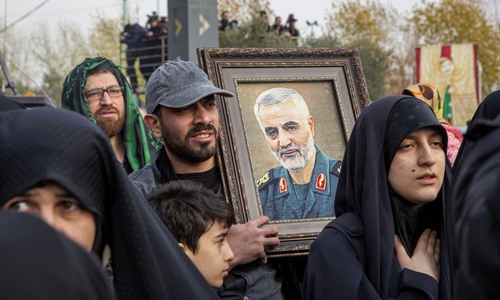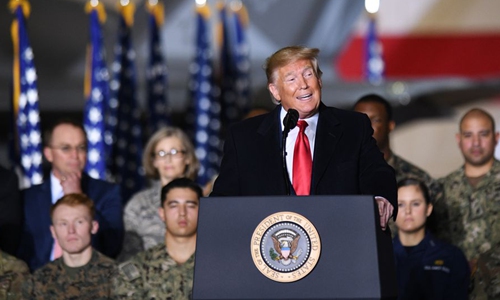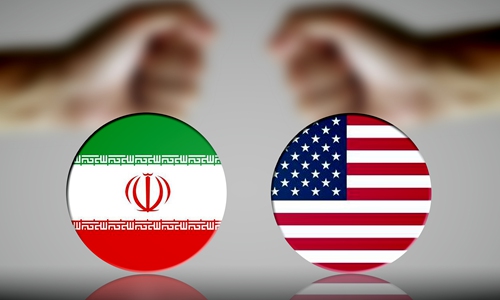HOME >> WORLD
Trump says Soleimani killing 'to stop war' as Iran tensions soar
Source:CGTN Published: 2020/1/4 16:31:48

A man holds a picture of top Iranian commander Qasem Soleimani during a protest in Tehran, Iran, on Jan. 3, 2020. (Xinhua/Ahmad Halabisaz)
US President Donald Trump on Friday insisted he was not seeking war with Iran, as Washington deployed additional troops to the Middle East in the wake of the killing of top Iranian general Qasem Soleimani in Iraq.
As Tehran promised "severe revenge" for the killing by US forces, Trump said he approved the strike on Soleimani because the Iranian "was plotting imminent and sinister attacks on American diplomats and military personnel."
Reports of a fresh air strike emerged on Saturday meanwhile, with Reuters citing an Iraqi army source as saying six people were killed and three others critically injured when an Iraqi militia convoy was hit north of Baghdad.
Sixty-two-year-old Soleimani, head of the elite Quds Force, was killed by a missile fired from a US drone when he was near Baghdad's international airport, according to US officials. Five Revolutionary Guards were also killed, along with five members of a pro-Iranian paramilitary force in Iraq, the Hashed al-Shaabi.
China and other countries have appealed for restraint to be exercised in the wake of the killing.
How many US troops are being deployed?
Trump, who has repeatedly claimed to be pulling US troops out of conflict zones, on Friday sent more soldiers to the Middle East.
A Pentagon official said 3,000 to 3,500 troops from the 82nd Airborne Division's Global Response Force, which had already had sent hundreds of reinforcements earlier this week after protests at the US embassy in Baghdad, will go to Kuwait.
Some 14,000 other troops have already been deployed as reinforcements to the Middle East this year, and the US already had around 60,000 military personnel in the region.

US President Donald Trump File Photo: Xinhua
What has Trump said?
Trump, speaking from his Mar-a-Lago resort in Florida, said Soleimani was "terminated" when he was on the verge of attacking US diplomats but he insisted that Washington is not seeking to topple Iran's government.
"Soleimani was plotting imminent and sinister attacks on American diplomats and military personnel, but we caught him in the act," Trump said, without providing evidence for the claim.
Soleimani "killed or badly wounded thousands of Americans over an extended period of time, and was plotting to kill many more...but got caught!" Trump tweeted on Friday. "He should have been taken out many years ago!"
National Security Advisor Robert O'Brien told reporters the intelligence that he said indicated the Iranian general was planning attacks against US citizens was "extraordinarily sensitive."
Trump, who has adopted a hardline approach to Iran since taking office, attempted to lower tensions by insisting that he does not want war.
"We did not take action to start a war," he said, adding: "We do not seek regime change."
How has Iran reacted?
Iran reacted with fury to the death of Soleimani, often referred to as the country's second most important leader. On Friday, Tehran told the United Nations Security Council that it reserves its right to self-defense under international law after the killing.
Supreme Leader Ayatollah Ali Khamenei vowed to avenge Soleimani's death. "A severe retaliation awaits murderers who have the blood of Soleimani and that of other martyrs on their wicked hands from last night's incident," he said in a statement.
Earlier, Foreign Minister Javad Zarif described the killing as "an act of international terrorism."
Tens of thousands of protesters in Tehran torched US flags and chanted "death to America" following the Soleimani's death.

Photo:IC
What has the global response been?
Iraqi Prime Minister Adel Abdel Mahdi called the strike a "flagrant violation" of a security accord with the US, warning it would "spark a devastating war in Iraq." Paramilitary figures in Iraq called on their fighters to "be ready," while leading Hashed member Hadi al-Ameri urged Iraqi lawmakers there "to oust foreign troops."
United Nations Secretary-General Antonio Guterres on Friday expressed deep concerned over the rise in tensions in the Middle East, his spokesman said.
"The Secretary-General has consistently advocated for de-escalation in the Gulf. He is deeply concerned with the recent escalation,"said Farhan Haq. "This is a moment in which leaders must exercise maximum restraint. The world cannot afford another war in the Gulf."
China's foreign ministry spokesperson Geng Shuang said on Friday the country consistently opposes the use of force in international relations, adding that peace and stability in the Middle East must be upheld. China urges relevant sides, especially the US, to exercise restraint and refrain from any actions that might escalate the situation, he added.
Differences should be resolved through dialogue and consultation, Yang Jiechi, a member of the Political Bureau of the Communist Party of China Central Committee, said on Friday in a phone conversation with US Secretary of State Mike Pompeo.
European nations including France, Germany and the UK have urged Trump to deescalate tensions.
RELATED ARTICLES: